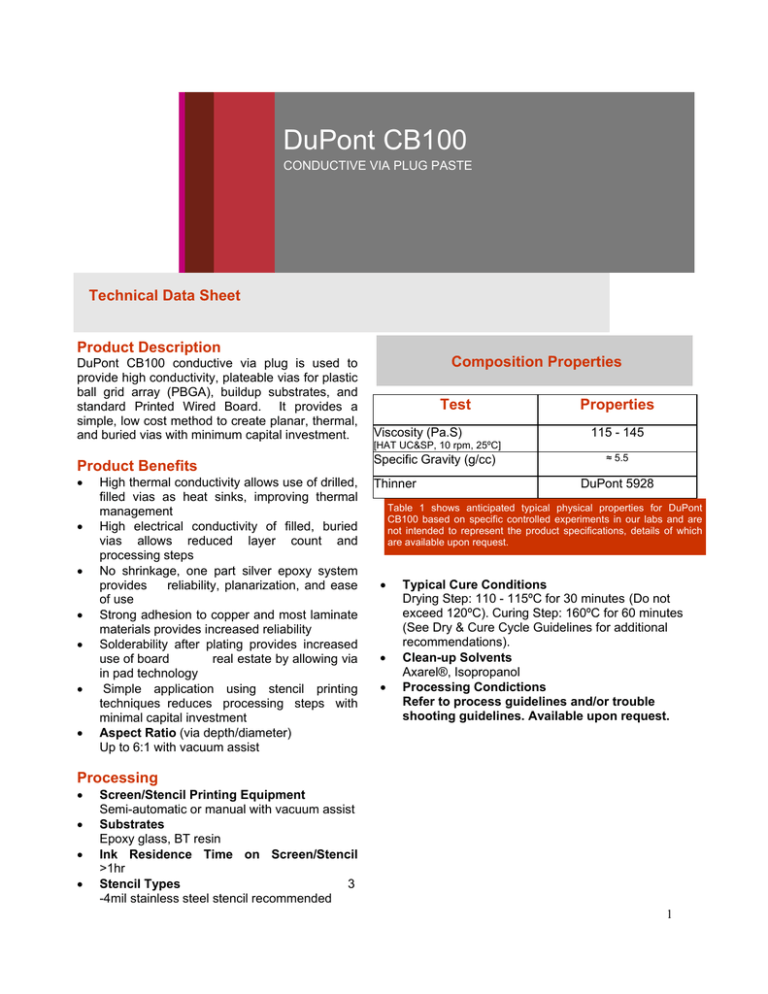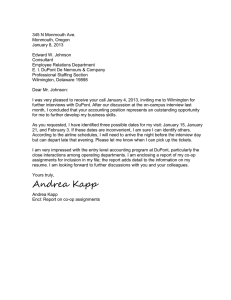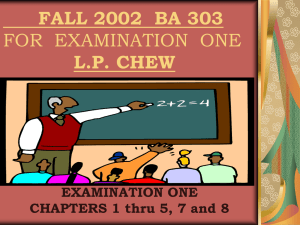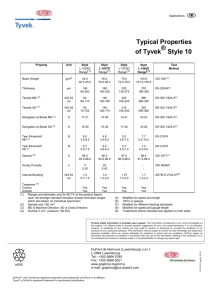
DuPont CB100
CONDUCTIVE VIA PLUG PASTE
Technical Data Sheet
Product Description
DuPont CB100 conductive via plug is used to
provide high conductivity, plateable vias for plastic
ball grid array (PBGA), buildup substrates, and
standard Printed Wired Board. It provides a
simple, low cost method to create planar, thermal,
and buried vias with minimum capital investment.
Product Benefits
High thermal conductivity allows use of drilled,
filled vias as heat sinks, improving thermal
management
High electrical conductivity of filled, buried
vias allows reduced layer count and
processing steps
No shrinkage, one part silver epoxy system
provides
reliability, planarization, and ease
of use
Strong adhesion to copper and most laminate
materials provides increased reliability
Solderability after plating provides increased
use of board
real estate by allowing via
in pad technology
Simple application using stencil printing
techniques reduces processing steps with
minimal capital investment
Aspect Ratio (via depth/diameter)
Up to 6:1 with vacuum assist
Composition Properties
Test
Viscosity (Pa.S)
Properties
115 - 145
[HAT UC&SP, 10 rpm, 25ºC]
Specific Gravity (g/cc)
Thinner
≈ 5.5
DuPont 5928
Table 1 shows anticipated typical physical properties for DuPont
CB100 based on specific controlled experiments in our labs and are
not intended to represent the product specifications, details of which
are available upon request.
Typical Cure Conditions
Drying Step: 110 - 115ºC for 30 minutes (Do not
exceed 120ºC). Curing Step: 160ºC for 60 minutes
(See Dry & Cure Cycle Guidelines for additional
recommendations).
Clean-up Solvents
Axarel®, Isopropanol
Processing Condictions
Refer to process guidelines and/or trouble
shooting guidelines. Available upon request.
Processing
Screen/Stencil Printing Equipment
Semi-automatic or manual with vacuum assist
Substrates
Epoxy glass, BT resin
Ink Residence Time on Screen/Stencil
>1hr
Stencil Types
3
-4mil stainless steel stencil recommended
1
Process Recommendations
Dry & Cure Cycle Guidelines
(Based on Panel Thickness)
Copper Clad Substrate
Since other variables can effect the Dry and Cure
Rate, such as board density, via diameter, oven air
flow and oven load, this is meant to be a starting
point to help ensure fully dried and cured plugged
vias.
Drill Through Holes
Metallize
Via Plug
Dry Via Plug
Cure
Dry Schedule
Cure Schedule
<.030
110ºC/60 min
160ºC/60 min
.030 - .062
110ºC/90 min
160ºC/90 min
.063 - .120
110ºC/2 hrs
160ºC/2 hrs
.121 - .175
110ºC/3 hrs
160ºC/3 hrs
>.175
110ºC/4 hrs
160ºC/4 hrs
* Drying Step: Do not exceed 120ºC
Scrub
Print & Etch
Process
Panel Thickness
Flash
Electroplate
Print & Etch
Process
TM A
Scan CB100 Pellet
Probe Position (mm)
C T E , 25-115 C =27.0 ppm /deg C
C T E , 115-200 C = 47.2 ppm /deg C
Tem perature (°C )
1) H eat from 25.0° C to 210.0°C at 10.0° C /min
2
Table 1
Typical Physical Properties
Test
Plating
Compatible with standard Electroless and
Electro plating
Properties
Solderability
Solderable after plating only
Sheet Resistivity (mΩ/sq)
[@ 25µ thickness)
Plated
Unplated
3-5
50 - 100
Volume Resistivity (Ω/centimeter)
0.00016
Maximum Processing Temperature
> 175ºC
Via Plug Adhesion
7 - 10 Pounds (31 - 48 Newton)
>5
Out Gassing: Test Method ASTM E595
(NASA Out gassing Test)
TG (ºC) (Glass Transition)
115
Sample
I.D.
%TML
% CVCM
(Total mass loss)
(Collected volatile
condensable material)
TCE (ppm)
35
CB100
0.050
0.00
Abrasion Resistance (H) (Pencil
Hardness) [IPC-TF 870 2.4.27.2]
*see attached TMA
TML is well below the normal acceptance limit of 1.0%
CVCM is below the normal acceptance level of 0.10%
Table 2
Environmental Properties
Thermal Schock (ºC)
-40 to +85
(30 minutes, Dwell)[5 cycles]
Dry Heat (ºC) [500 hours]
85
Humidity (ºC)
At 95% RH, 500 hours
+40
[Mil Std 202E, Method 102 condition A]
At 85% RH, 10 Volt bias, 168 Hours
Thermal Cycle (ºC) [1000 cycles]
85
-65 to +125
(IPC-TM-60 2.6.7.2]
Thermal Stress (ºC) [Solder Float]
288
(Five 10 second cycles)
Electromigration (ºC)
121
100% RH, 2atm, 168 hours, 50 volt
(Pressure cooker Test)
HAST (ºC)
121
100% RH, 2atm, 168 hours
(Pressure cooker test)
NO INCREASE IN RESISTIVITY AFTER
ENVIRONMENTAL TEST
Table 1 & 2 show anticipated typical physical properties for DuPont CB100
based on specific controlled experiments in our labs and are not intended to
represent the product specifications, details of which are available upon
request.
3
Storage and Shelf Life
For more information on DuPont CB100 or other DuPont Microcircuit
Shelf life is three months from date of shipment, when
refrigerated ( 0 – 4°C ). Storage at ( -15 to - 20 °C ) will
further prolong shelf life. Storage at room temperature is
not recommended. Gradual polymerization and associated
viscosity increase, and mechanical separation can be
expected over a period of a few months. When refrigerating
and / or freezing conditions are used for storage, materials
should be allowed to equilibrate to room temperature
before opening to prevent pick up of moisture from
condensation.
Materials products, please contact your local representative:
After the containers are opened, use and storage
conditions and the possible effects of contamination make
shelf life limits unpredictable.
Safety and Handling
For Safety and Handling information pertaining to this
product, read the Material Safety Data Sheet (MSDS).
Americas
DuPont Microcircuit Materials
14 T.W. Alexander Drive
Research Triangle Park, NC 27709
Tel.: 800-284-3382
Europe
Du Pont (U.K.) Limited
Coldharbour Lane
Bristol BS16 1QD
U.K.
Tel.: 44-117-931-3191
Asia
DuPont Kabushiki Kaisha
DuPont Electronic Center
KSP R&D B213, 2-1, Sakado 3-chome, Takatsu-ku,
Kawasaki-shi, Kanagawa, 213-0012, Japan
Tel: +81-44-820-7575
Copyright © 2009 DuPont. All rights reserved. The DuPont Oval, DuPont™, The miracles of
science™, Green Tape™ and all products or words denoted with ® or ™ are registered
trademarks or trademarks of E. I. du Pont de Nemours and Company or its affiliates (“DuPont”).
NO PART OF THIS MATERIAL MAY BE REPRODUCED, STORED IN A RETRIEVAL
SYSTEM OR TRANSMITTED IN ANY FORM OR BY ANY MEANS ELECTRONIC,
MECHANICAL, PHOTOCOPYING, RECORDING OR OTHERWISE WITHOUT THE
PRIOR WRITTEN PERMISSION OF DUPONT.
Caution: Do not use in medical applications involving implantation in the human body or contact
with internal body fluids or tissue unless the product is provided by DuPont under a formal
written contract consistent with the DuPont Policy Regarding Medical Applications of DuPont
Materials H-50103-2 (“Medical Applications Policy”) and which expressly acknowledges the
contemplated use. For additional information, please request a copy of DuPont Medical Caution
Statement H-50102-2 and the DuPont Medical Applications Policy.
The information provided herein is offered for the product user’s consideration and examination.
While the information is based on data believed to be reliable, DuPont makes no warranties,
expressed or implied as to the data’s accuracy or reliability and assumes no liability arising out of
its use. The data shown are the result of DuPont laboratory experiments and are intended to
illustrate potential product performance within a given experimental design under specific,
controlled laboratory conditions. While the data provided herein falls within anticipated normal
range of product properties based on such experiments, it should not be used to establish
specification limits or used alone as the basis of design. It is the product user’s responsibility to
satisfy itself that the product is suitable for the user’s intended use. Because DuPont neither
controls nor can anticipate the many different end-uses and end-use and processing conditions
under which this information and/or the product described herein may be used, DuPont does not
guarantee the usefulness of the information or the suitability of its products in any given
application. Users should conduct their own tests to determine the appropriateness of the
products for their particular purpose.
The product user must decide what measures are necessary to safely use the product, either alone
or in combination with other products, also taking into consideration the conditions of its
facilities, processes, operations, and its environmental, health and safety compliance obligations
under any applicable laws.
This information may be subject to revision as new knowledge and experience become available.
This publication is not to be taken as a license to operate under, or recommendation to infringe
any patent.
DuPont Taiwan Ltd
45, Hsing-Pont Road,
Taoyuan, Taiwan 330
Tel.: 886-3-377-3616
DuPont China Holding Co. Ltd
Bldg 11, 399 Keyuan Rd., Zhangji Hi-Tech Park,
Pudong New District, Shanghai 201203, China
Tel.: 86-21-6386-6366 ext.2202
DuPont Korea Inc.
3~5th Floor, Asia tower #726,
Yeoksam-dong, Gangnam-gu
Seoul 135-719, Korea
Tel.: 82-10-6385-5399
E. I. DuPont India Private Limited
7th Floor, Tower C, DLF Cyber Greens,
Sector-25A, DLF City, Phase-III,
Gurgaon 122 002 Haryana, India
Tel.: 91-124-4091818
Du Pont Company (Singapore) Pte Ltd
1 HarbourFront Place, #11-01
HarbourFrong Tower One,
Singapore 098633
Tel.: 65-6586-3022
http://mcm.dupont.com
MCMCB100(10/2013)
4





